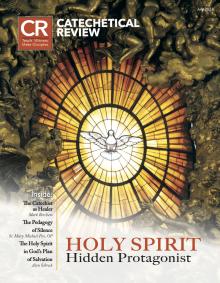“Have you heard something? Let it die with you. Be brave, it will not make you burst!” – Sirach 19:10
 “I tell you, on the day of judgment men will render account for every careless word they utter; for by your words you will be justified, and by your words you will be condemned” (Mt 12:37). Although the Scriptures have strong words regarding the sin of gossip—an offense in speech against the reputation of another—the habit is often taken too lightly and not regularly preached about from the pulpit.[1] Scriptural admonitions against gossiping don’t seem to be enough to break this cultural habit. Neither does the reality that a culture of gossip destroys trust and therefore undermines the Church’s evangelization efforts. So, what is an effective remedy for this pervasive spiritual ill?
“I tell you, on the day of judgment men will render account for every careless word they utter; for by your words you will be justified, and by your words you will be condemned” (Mt 12:37). Although the Scriptures have strong words regarding the sin of gossip—an offense in speech against the reputation of another—the habit is often taken too lightly and not regularly preached about from the pulpit.[1] Scriptural admonitions against gossiping don’t seem to be enough to break this cultural habit. Neither does the reality that a culture of gossip destroys trust and therefore undermines the Church’s evangelization efforts. So, what is an effective remedy for this pervasive spiritual ill?
Crossing the Threshold of Trust
Before anyone becomes an intentional disciple of Jesus Christ, which means making “a conscious commitment to follow Jesus in the midst of His Church as an obedient disciple and reorder one’s life accordingly,”[2] there are four thresholds that need to be reached. The first of these thresholds—the one that gossip destroys right at the outset—is initial trust.
Sherry Weddell, in her book Forming Intentional Disciples, describes trust as the most basic prerequisite for discipleship.[3] If this is true—and if discretion in speech is a basic prerequisite for trust—then rooting out gossip is an absolute must for any effective evangelical effort. If we aren’t trustworthy on a basic, human level, how will we ever be considered trustworthy with regard to supernatural things? How many times have we encountered people of faith who refuse to go to church because their experience of the parish community is one of gossip and judgment?
Dr. Brené Brown confirms gossip as the destroyer of trust. She defines trust as “choosing to make something important to you vulnerable to the actions of someone else.”[4] Distrust then, means that “what I have shared with you that is important to me, is not safe with you.”[5] In her exploration of the anatomy of trust, Brown came up with the acronym “BRAVING.” The letter V in the acronym stands for “vault,” which means keeping information others have shared with you confidential. Violating the “vault” means a person will no longer be considered trustworthy.
It’s no secret that corruption in the hierarchy has vastly contributed to not only a decrease in Church membership but also loss of faith and trust in God in general. But these are “high-level” issues beyond the scope of most of our callings to fix. We should be concerned primarily with not only our own continuing conversions but also creating a culture of trust conducive to missionary discipleship in our parishes, schools, and apostolates.
Sabotaging Personal Vocations
The deeper heart of the tragedy of gossip, however, is that it destroys the personal vocations of those who gossip and those about whom gossip is spread. Our personal vocation—our primary calling—is in becoming who God created us to be in our unrepeatable uniqueness. Whatever we end up doing in life or whatever our state in life may be, the manifestation of our true self is what brings glory to God and allows the fulfillment of our mission. Gossip sabotages one’s personal vocation in that it attacks two crucial goods: our name and our friendships.
The evil one spares no opportunity to make us believe lies about our goodness. He wants us to believe we are fundamentally flawed (as opposed to deeply broken). How can we even begin to trust ourselves and God if the starting point in our minds is that we are no good? When we gossip about others, we act as the mouthpiece of the enemy. Our words, then, cause injury to another person’s name. Doing this negatively impacts our interactions with others, and, ultimately, our holiness.
Furthermore, gossip, because it is a breach of trust, ruins friendships. Instead of using words to tear people down, words are meant to dignify one’s being. Once someone finds out or senses they have been talked about, they have passed the point of no return, so to speak, on ever trusting the person who spread the gossip—or the community—again.
A priest-friend of mine tells the story of an interaction he had in high school that changed his life. A friend of his told him, “I think you have a gift for speaking. But I am disappointed because you so often use your words to tear people down instead of using your gift to build people up.” Upon hearing those words of correction, he was given an intuitive grace of a priestly vocation. And he is an incredible preacher today. How could such a simple, yet profound, correction generate an intuition toward vocation? Grace is mysterious. But something in his friends’ words—not words of criticism, condemnation, or judgment but rather the encouragement of a perceived gift—was just the grace that needed to be unlocked to recognize the call. This story is an example of how our voice can become God’s voice in the lives of our friends and loved ones. As Pope Benedict wrote, “God wants to come to men only through other men.”[6]
Prophecy, not Gossip
In his book Atomic Habits, James Clear notes that in order to root out vice and build virtue, the motivation for change isn’t primarily about the goals, outcomes, or systems that change a person’s behavior. Real behavioral change is ultimately inspired by one thing: identity.[7] In other words, we change how we behave based on how we view ourselves. What is the identity of the Christian? How should we see ourselves so as to remember how to conduct ourselves?
Every baptized Christian’s identity takes three distinct forms as priest, prophet, and king. For our purposes in this article, the prophetic dimension of our personal vocations is most relevant. Prophecy here isn’t about predicting the future but about seeing someone from God’s perspective with their identity, purpose, and mission in full view.
St. Paul writes that he earnestly desires for us to have all the gifts of the Holy Spirit but “especially that you may prophesy” (1 Cor 14:1). Because “he who prophesies speaks to men for their upbuilding and encouragement and consolation . . . he who prophesies edifies the church” (1 Cor 14:3–4). Therefore, a prophetic Church is one made up of men and women who use their words to build each other up in their identity as sons and daughters of God. St. James reminds us of the connection between the prophetic and our identities when it comes to the use our tongues:
With it we bless the Lord and Father, and with it we curse men, who are made in the likeness of God. From the same mouth come blessing and cursing. My brethren, this ought not to be so. Does a spring pour forth from the same opening freshwater and brackish? Can a fig tree, my brethren, yield olives, or a grapevine figs? No more can salt water yield fresh. (Jas 3:9–12, emphasis added)
Our words are meant for prophecy, not for gossip. Where gossip tears down someone’s dignity, prophecy builds it up and releases the grace of becoming more of who God has destined us to be through words of motivation and encouragement. Imagine a prophetic Church! A Church that is not only a safe space of trust and friendship but a Church that has a prophetic vision for the unique destiny of each soul. As Joseph Ratzinger wrote, “Prophecy in the biblical sense does not mean to predict the future but to explain the will of God for the present, and therefore show the right path to take for the future.”[8]
Keeping in mind a Christian’s identity as a prophet is perhaps the greatest motivator for a shift in ecclesial culture away from sins of the tongue. And in that remembrance, there is also profound discovery of not just our general identities as priests, prophets, and kings but the unrepeatable expressions of those identities found in our unique personal vocations.
Simone Rizkallah is currently the Director of Program Growth for Endow Groups. Endow cultivates the intellectual life of women to unleash the power of the feminine genius in the world. Check out the collection of 8-12 week studies at www.endowgroups.org
Notes
[1] The Catechism of the Catholic Church distinguishes between detraction, the sin of sharing private information without good cause, and calumny, spreading false rumors (2477). See also St. Thomas Aquinas’ Summa Theologiae treatise on justice (q. 58) for more categories of sins of the tongue.
[2] Sherry Weddell, “The Five Thresholds of Conversion,” Faith Magazine, March 2018, https://faithmag.com/5-thresholds-conversion.
[3] Weddell writes that the next thresholds include spiritual curiosity, spiritual openness, and spiritual seeking before crossing the threshold into intentional discipleship. Sherry A. Weddell, Forming Intentional Disciples: the Path to Knowing and Following Jesus (Huntington, IN: Our Sunday Visitor, 2017), 127–28, 129–30.
[4] Brené Brown, “The Anatomy of Trust,” Unlocking Us with Brené Brown (podcast), recording of a talk given at UCLA for Oprah Winfrey’s Super Soul Sessions, 2019, https://brenebrown.com/podcast/the-anatomy-of-trust/
[5] Brown, “Anatomy of Trust.”
[6] Joseph Ratzinger, What It Means to be a Christian (San Francisco: Ignatius Press, 2005), 56.
[7] Escaping the Ordinary (B. C. Marx), “How to become 37.78 times better at anything | Atomic Habits summary (by James Clear),” https://youtu.be/PZ7lDrwYdZc.
[8] Congregation for the Doctrine of Faith, The Message of Fatima, https://www.vatican.va/roman_curia/congregations/cfaith/documents/rc_con....
This article originally appeared on pages 28-29 of the print edition.
Art credit: Pixabay.com
This article is from The Catechetical Review (Online Edition ISSN 2379-6324) and may be copied for catechetical purposes only. It may not be reprinted in another published work without the permission of The Catechetical Review by contacting [email protected]

















